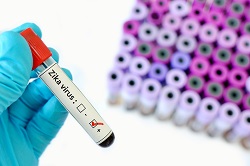Newly found antibodies could lead to treatment against both dengue and Zika viruses
The growth of vector-born diseases is one of the main consequences of global warming. One of the most known forms of these diseases, the dengue virus, threatens the life of about 500 000 people every year. The Zika virus is yet another form, although it generally affects people for 2 to 7 days only. But even then, Zika patients in Brazil and French Polynesia were recently found to be suffering from neurological complications such as the Guillain-Barré syndrome, while this virus is also the cause of microcephaly in foetus. Previous efforts from Institut Pasteur, the CNRS and Imperial College London had led to the discovery of antibodies capable of neutralising the four known types of dengue virus. Thanks to funding coming notably from the DENFREE project – which aims to identify key factors determining dengue transmission and develop novel diagnostic tools – the three institutions, along with the University of Vienna, brought this research a step further by focusing on the Zika virus. ‘We wanted to see whether the antibodies isolated for dengue could be used to neutralise other flaviviruses, and Zika seemed like the best candidate,’ explained Félix Rey, Head of the Structural Virology Laboratory at the Institut Pasteur. The team selected two antibodies for their research, which were both known to be capable of preventing the proliferation of the dengue virus. These antibodies were isolated in dengue patients and then presented to the Zika virus. The results caught the team by surprise: ‘We never expected to discover that the dengue virus and the Zika virus are so close that some antibodies produced against the dengue virus could also neutralize the Zika virus so potently,’ stressed Rey. Indeed, one of the two tested antibodies was able to neutralise the Zika virus even better than it did for the dengue virus. Another key element of the research was the use of crystallography to identify the binding site on the Zika virus. The scientists produced crystals containing the ‘antibody-envelope protein’ complex, before using powerful X-rays to create a 3D reconstruction of the precise location where the antibody binds to the envelope protein. By doing so, the team found that the dengue and Zika viruses share the same antibody binding site. These results could eventually lead to the development of a universal vaccine that offers simultaneous protection against dengue and Zika virus disease. They were published in the journal ‘Nature’ on 23 June 2016. ‘The antibodies could be used, for example, to protect pregnant women at risk of contracting the Zika virus, because there is currently no vaccine or treatment for this disease,’ concluded Rey. The DENFREE project will run until the end of 2016. It is supported by the EU’s FP7 programme to the tune of EUR 8.4 million. For more information please see: project website
Countries
France



